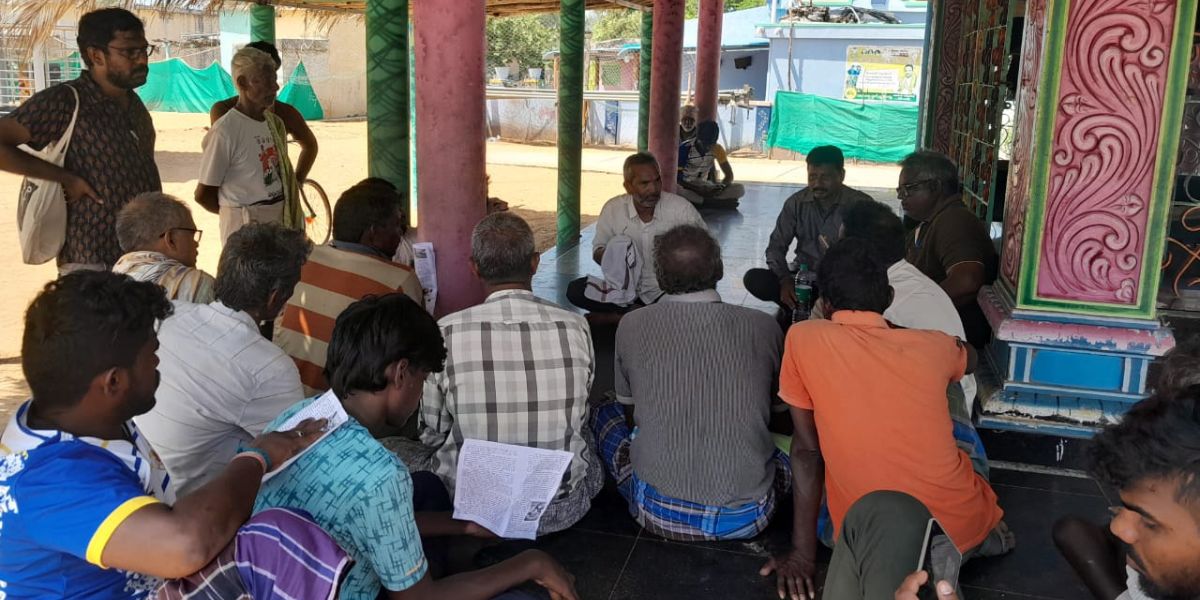The proposed acquisition plan raises concerns about its adverse impact on marginalised SC and ST communities.
Published Jul 27, 2025 | 2:47 PM ⚊ Updated Jul 27, 2025 | 2:47 PM

Villagers joined the campaign against the Indosol Solar's proposed vertically integrated solar module manufacturing project in Nellore district of Andhra Pradesh. (X)
Synopsis: Farmers, activists and Opposition parties are opposing the move by the TDP-led NDA government in the state to acquire 8,348 acres of fertile land in Ulavapadu. They argue that the acquisition threatens livelihoods, food security, and the region’s ecological balance.
Fierce opposition is building up in Ulavapadu mandal in the SPSR Nellore district of Andhra Pradesh against the state government’s plan to acquire 8,348 acres of fertile land. The land is proposed to be allocated to Indosol Solar Private Limited for establishing a ₹69,000 crore solar power project.
The move to acquire the land by the TDP-led NDA government in the state is facing resistance from farmers, activists, and Opposition parties. They argue that the acquisition threatens livelihoods, food security, and the region’s ecological balance.
According to sources, individuals belonging to Scheduled Caste (SC) communities own approximately 750 acres of the 8,348 acres of land proposed for acquisition, while the Scheduled Tribe (ST) communities own about 500 acres. The acquisition raises concerns about its adverse impact on marginalised communities.
The lands in Karedu and its hamlets are fertile, supporting farmers who cultivate two paddy crops annually, along with groundnut, mangoes, coconuts, and aquaculture. As is typical, farmers share an emotional bond with their land, which serves as their cultural and ancestral lifeline.
The first signs of unrest emerged on 2 July, when farmers organised a protest, blocking National Highway-16 for half an hour, disrupting vehicular traffic between Chennai and Kolkata. They demanded an immediate halt to the acquisition.
Two days later, on 4 July, during a gram sabha in Karedu, revenue officials faced strong resistance. Angry farmers demanded that the officials leave their village.
Ironically, during the previous YSRCP regime, the TDP, then in Opposition, had supported farmers opposing the Indosol project’s location, labelling it a major scam. Now, the same TDP is in power with its allies Jana Sena and BJP, and it is pushing to acquire land for Indosol.
Equally striking is that the YSRCP, which supported Indosol when in power, now joins hands with the farmers.
The CPI(M) has called for a probe into why the NDA is keen on allotting this land to Indosol. The party questioned the government’s U-turn, asking why fertile land is targeted when barren alternatives are available. The Human Rights Forum (HRF) also joined the cause, organising street meetings and pamphlet campaigns in Karedu on 16 July.
With political stakes being high, the Opposition YSRCP has swung into action. When a delegation of Karedu farmers met YSRCP president and former chief minister YS Jagan Mohan Reddy on 15 July at the party’s Tadepalli office and submitted a petition for support.
Reddy said: “Farmers cannot be forced out of their land without consent.” He said he would visit Karedu and join protests, if needed.
On 22 July, Forum For Better Visakha Convenor EAS Sarma wrote to Chief Minister N Chandrababu Naidu, urging a halt to the land acquisition in Karedu and its hamlets. He described it as distressing that thousands of acres of verdant farmland are being taken for allotment to a company for setting up a solar plant.
Sarma maintained that farmers in these villages use groundwater, with the presence of a high water table, to cultivate paddy, vegetables, groundnut, and mangoes. The acquisition would also disrupt the lives of traditional fishermen and affect the villages’ cattle wealth.
He questioned whether the government had assessed whether the project required such extensive land, its impact on local lives, or the benefits it would offer affected communities. It remains unclear if alternative livelihoods would be provided to displaced families, he said.
Sarma pointed out that even in an advanced country like the US, a 10-gigawatt solar power plant in Tennessee was established on just 550 acres, suggesting the Indosol project would not need more than 1,600 acres of fallow land, not necessarily agricultural land.
In response, Nellore district officials attempted to clarify farmers’ concerns. Collector O Anand told the media that the acquisition involves only 4,800 acres across three hamlets — Upparapalem, Ramakrishnapuram, and Pottenugunta — rather than the full 8,348 acres.
He said: “We are in talks with the farmers and other stakeholders. We will not force them. We will negotiate with them and arrive at a mutually agreeable solution.”
However, farmers remain unconvinced, arguing that even a scaled-down acquisition would devastate their livelihoods. They propose using non-cultivable land elsewhere in the district for the solar project to preserve Karedu’s agricultural ecosystem.
For now, Karedu’s fertile plains are at the centre of a growing movement. It is a clash between the promise of renewable energy and desperate attempts to sustain agricultural heritage.
The government faces the task of doing a delicate balancing act to ensure farmers are not deprived of their livelihoods while advancing the solar power sector, a critical component of the state’s economic strategy for triggering all-around development.
(Edited by Muhammed Fazil.)
